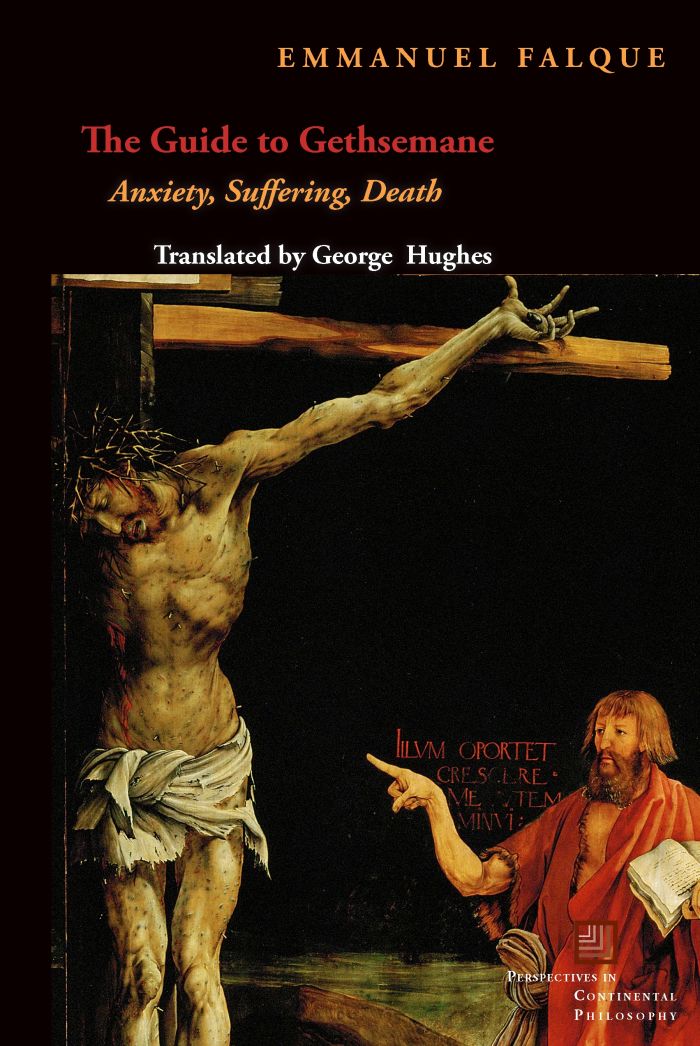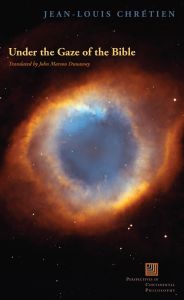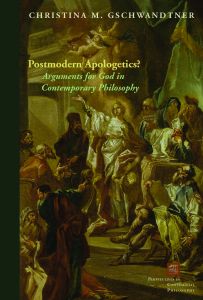The Guide to Gethsemane
Anxiety, Suffering, Death

This book can be opened with

Anxiety, suffering and death are not simply the “ills” of our society, nor are they uniquely the product of a sick and sinful humanity. We must all some day confront them, and we continually face their implications long before we do. In that sense, the Garden of Gethsemane is not merely a garden “outside the walls” of Jerusalem but also the essential horizon for all of us, whether we are believers or not.
Emmanuel Falque explores, with no small measure of doubt, Heidegger’s famous statement that by virtue of Christianity’s claims of salvation and the afterlife, its believers cannot authentically experience anxiety in the face of death. In this theological development of the Passion, already widely debated upon its publication in French, Falque places a radical emphasis on the physicality and corporeality of Christ’s suffering and death, marking the continuities between Christ’s Passion and our own orientation to the mortality of our bodies. Beginning with an elaborate reading of the divine and human bodies whose suffering is masterfully depicted in the Isenheim Altarpiece, and written in the wake of the death of a close friend, Falques’s study is both theologically rigorous and marked by deeply human concerns.
Falque is at unusual pains to elaborate the question of death in terms not merely of faith, but of a “credible Christianity” that remains meaningful to non-Christians, holding, with Maurice Blondel, that “the important thing is not to address believers but to say something which counts in the eyes of unbelievers.” His account is therefore as much a work of philosophy as of theology—and of philosophy explicated not through abstractions but through familiar and ordinary experience. Theology’s task, for Falque, is to understand that human problems of the meaning of existence apply even to Christ, at least insofar as he lives in and shares our finitude. In Falque’s remarkable account, Christ takes upon himself the burden of suffering finitude, so that he can undertake a passage through it, or a transformation of it.
This book, a key text from one the most remarkable of a younger generation of philosophers and theologians, will be widely read and debated by all who hold that theology and philosophy has the most to offer when it eschews easy answers and takes seriously our most anguishing human experiences.
“In this dramatic opening to his triptych on Christ’s passion, Emmanuel Falque demonstrates—once again—his complete refusal to rest with easy answers. Christ, he argues, experiences anxiety and suffering that are just as real and confusing as that of any ordinary person. The result is that God does not suffer at some comfortable distance but right here in our midst. One can hardly read this book without being deeply moved.”—Bruce Ellis Benson, author of Liturgy as a Way of Life
Anxiety, suffering and death are not simply the “ills” of our society, nor are they uniquely the product of a sick and sinful humanity. We must all some day confront them, and we continually face their implications long before we do. In that sense, the Garden of Gethsemane is not merely a garden “outside the walls” of Jerusalem but also the essential horizon for all of us, whether we are believers or not.
Doubtful of Heidegger’s famous statement that the notion of salvation renders Christians unable authentically to experience anxiety in the face of death, Falque explores the Passion with a radical emphasis on the physicality and corporeality of Christ’s suffering and death, and on continuities with the mortality of our bodies. Written in the wake of the death of a close friend, Falques’s study is both theologically rigorous and marked by deeply human concerns.
Falque is at pains to elaborate the question of death in terms not of faith, but of a “credible Christianity” that remains meaningful to nonbelievers. His account is therefore as much a work of philosophy as of theology—and of philosophy explicated not through abstractions but through familiar and ordinary experience. Theology’s task, for Falque, is to understand that human problems of the meaning of existence apply even to Christ, at least insofar as he lives in and shares our finitude. In Falque’s remarkable account, Christ takes upon himself the burden of suffering finitude, so that he can undertake a passage through it, or a transformation of it.
Emmanuel Falque is Honorary Dean of the Faculty of Philosophy at the Catholic University of Paris.
George Hughes has served as Professor in the Faculty of Letters at the University of Tokyo.
In this dramatic opening to his triptych on Christ’s passion, Emmanuel Falque demonstrates—once again—his complete refusal to rest with easy answers. Christ, he argues, experiences anxiety and suffering that are just as real and confusing as that of any ordinary person. The result is that God does not suffer at some comfortable distance but right here in our midst. One can hardly read this book without being deeply moved.—Bruce Ellis Benson, author of Liturgy as a Way of Life
What this book does with power and sensitivity is to call Christians to a reflection on the reality of suffering and death, and to point unbelievers to the resources at the heart of Christianity, coming from Christ himself, for speaking to the reality of suffering and death.—Modern Theology
Death is a problem. No, not a problem. The problem. So painful, so tragic, so crushing is the fate that awaits us that we mortals tend to ignore it altogether. An old professor of mine used to quip that philosophers make for bad party guests because we are always thinking about death. Yet, as Emmanuel Falque rightly points out in his provocative book The Guide to Gethsemane: Anxiety, Suffering, Death, all of that good philosophical thinking amounts to little more than a flight from death, an unwillingness to look the raw brutality of finitude in the eye.—Reading Religion
Emmanuel Falque is Honorary Dean of the Faculty of Philosophy at the Catholic University of Paris. His most recent book in English is The Wedding Feast of the Lamb: Eros, the Body, and the Eucharist.
George Hughes (Translator)
George Hughes has served as Professor in the Faculty of Letters at the University of Tokyo.
Translator’s Note xiii
Preface to the English-Language Edition xv
Opening: The Isenheim Altarpiece or “The Taking on Board of Suffering” xvii
Introduction: Shifting Understandings of Anxiety 1
PART I: THE FACE-TO-FACE OF FINITUDE
1 From the Burden of Death to Flight before Death 7
§1 The Burden of Death, 7 ■ §2 Fleeing from Death, 8
2 The Face of Death or Anxiety over Finitude 10
§3 Death “for Us” Humans, 10 ■ §4 Genesis and Its
Symbolism, 11 ■ §5 The Mask of Perfection, 12 ■ §6 The Image
of Finitude in Man, 13 ■ §7 Finitude: Finite and Infinite, 16 ■
§8 Finitude and Anxiety, 16 ■ §9 The Eclipse of Finitude, 17 ■
§10 The Face of Death, 18 ■ §11 To Die “with,” 19
3 The Temptation of Despair or Anxiety over Sin 22
§13 Inevitable Death, 22 ■ §14 The Conquest of Sin, 22 ■
§15 Sin and Anxiety, 23 ■ §16 The Temptation of Despair, 24
4 From the Affirmation of Meaninglessness to the Suspension of Meaning 26
§17 The Life Sentence, 26 ■ §18 The Christian Witness, 27 ■
§19 Meaninglessness and the Suspension of Meaning, 27
PART II: CHRIST FACED WITH ANXIETY OVER DEATH
§20 Two Meditations on Death, 29 ■ §21 Alarm and
Anxiety, 31
5 The Fear of Dying and Christ’s “Alarm” 33
§22 Taking on Fear and Abandonment, 33 ■ §23 The Cup,
Sadness, and Sleep, 34 ■ §24 Resignation, Waiting, and
Heroism, 35 ■ §25 The Silence at the End, 36 ■
§26 The Scenarios of Death, 37 ■ §27 The Triple
Failure of the Staging, 38 ■ §28 From Alarm to Anxiety, 39
6 God’s Vigil 41
§29 Remaining Always Awake, 41 ■ §30 The Passage of Death,
the Present of the Passion, the Future of the Resurrection, 42 ■
§31 Theological Actuality and Phenomenological Possibility, 43
7 The Narrow Road of Anxiety 45
§32 Indefiniteness, Reduction to Nothing, and Isolation, 45 ■
§33 The Strait Gate, 46 ■ §34 Anxiety over “Simply Death,” 47 ■
§35 Indefiniteness (Putting off the Cup) and the Powerless Power
of God, 47 ■ §36 Reduction to Nothing and Kenosis, 52 ■
§37 The Isolation of Humankind and Communion with the
Father, 54 ■ §38 Of Anxiety Endured on the Horizon of Death, 55
8 Death and Its Possibilities 57
§39 Manner of Living, Possibility of the Impossibility, and Death
as “Mineness,” 57 ■ §40 Being Vigilant at Gethsemane, 59 ■
§41 From the Actuality of the Corpse to Possibilities for
the Living, 60 ■ §42 The Death That Is Always His: Suffering in
God; The Gift of His Life and Refusal of Mastery, 63 ■
§43 The Flesh Forgotten, 66
PART III: THE BODY-TO-BODY OF SUFFERING AND DEATH
§44 Disappropriation and Incarnation, 69 ■ §45 Embedding in
the Flesh and Burial in the Earth, 70
9 From Self-Relinquishment to the Entry into the Flesh 73
§46 Suffering the World, 73 ■ §47 Living in the
World, 74 ■ §48 Otherness and Corruptibility, 74 ■
§49 Self-Relinquishment, 75 ■ §50 Passing to the Father,
76 ■ §51 Oneself as an Other, 77 ■ §52 Destitution and
Auto-Affection, 78 ■ §53 Alterity and Fraternity, 79 ■
§54 Entry into the Flesh, 80 ■ §55 The Anxiety “in”
the Flesh, 81 ■ §56 Toward Dumb Experience, 82
10 Suffering Occluded 84
§57 An Opportunity Thwarted, 84 ■ §58 Called into
Question, 86 ■ §59 Toward a Phenomenology of Suffering, 86
11 Suffering Incarnate 88
§60 Perceiving, or the Challenge of the Toucher-Touching,
88 ■ §61 The Modes of the Incarnate Being, 91 ■
§62 The Excess of the Suffering Body, 94
12 The Revealing Sword 97
§63 Sobbing and Tears, 97 ■ §64 Fleshly Exodus, 99 ■
§65 The Vulnerable Flesh, 100 ■ §66 The Non-Substitutable
Substitution, 101 ■ §67 The Act of Surrendering Oneself, 103 ■
§68 Toward a Revelation, 104 ■ §69 Useless Suffering, 104
Conclusion: The In-Fans [without-Speech] or the Silent Flesh 107
Epilogue: From One Triptych to Another 111
Notes 115
Index 157





